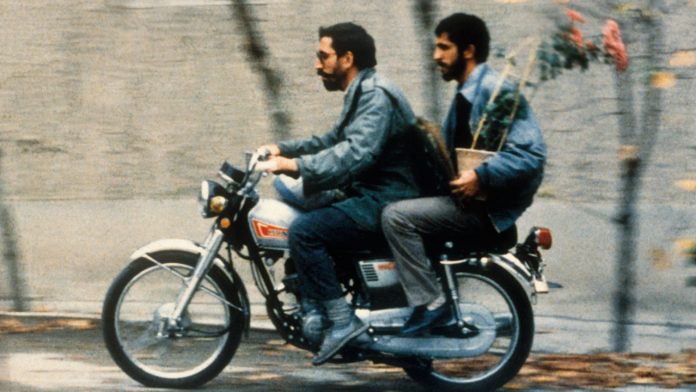Theo Sharieff
‘Close-Up’ tells the true story of an unemployed Iranian man, Hossein Sabzian, put on trial for fraud after impersonating the famous Iranian director Mohsen Makhmalbaf, and conning a middle-class family into believing they would star in his new film.
Close-Up’s strength is in its blending of real life and fiction. It tells a real-life story. Its cast is entirely made up of the people who were involved in the case – including Hossein Sabzian himself, the family he met, the man he impersonated, the journalist who originally broke the story in the Iranian press, the judge, and the film’s director, Abbas Kiarostami. There is no explanation throughout the film as to whether what we’re seeing is documentary footage or a re-enactment being played out.
Confusingly, Sabzian denies from the outset that he’s a conman. Kiarostami gives Sabzian – a downtrodden, reserved and otherwise voiceless man – the chance to explain to his audience why he did what he did, and more importantly to express his hardship. As the director explicitly explains to Sabzian in the courtroom, the camera is there for Sabzian to explain things that people might find hard to understand or accept.
Close-Up is a film which depicts and expresses the deep importance of art and cinema for ordinary working-class people seeking to deal with the hardships meted out by capitalism. It compassionately tells the story of a man who, after being thrown into unemployment, is driven to extreme lengths both to escape from the difficult conditions of his life and to fulfil his creative ambitions.
“I am interested in art and film”, is the first justification we hear from Sabzian. It explains nothing. But over the course of 90 minutes, we slowly discover what Sabzian really means and the real motives behind the crime he commits. There are the immediate material pressures he faces, including his desperation to provide a gift for his child, as well as to feed himself for just another day.
But there’s another reason too. Sabzian feels deeply that Makhmalbaf’s films speak for him and the day to day difficulties he faces. “No one wants to hear about them. Then a good man comes along who portrays all my suffering in his films, and I can go see them over and over again. They show the evil faces of those who trade on others, the rich who pay no attention to the simple material needs of the poor.”
He describes the desire he has held since childhood to create for himself, but explains that he never had the material means to do so. Impersonation for Sabzian in the end is the closest he is allowed to get to fulfilling his creative ambition.
Because of the film’s format, there’s no way of knowing for sure outside of the recounting of the events themselves if what is being expressed by the participants is the whole truth. Are they expressing their true thoughts, opinions, and motivations – or are they now performing for us?
It’s a question which isn’t answered. But when Sabzian speaks, it feels real. Outside of the film it’s reported that Sabzian spent the entirety of the small inheritance he received from his mother on a film camera, and dedicated days of his life to writing screenplays which never saw the light of day.
Perhaps the most important part of the trial is when Sabzian explains why he insisted on taking the family he deceived to see Makhmalbaf’s most successful film, ‘The Cyclist’. “I wanted to tell them: Don’t think a director is different from ordinary people. He’s one of you.” Sabzian and the film both want to challenge any preconceived idea of who in society is capable of creating art.
The film politically doesn’t seek to offer ideas as to how the day-to-day economic hardships of working people like Sabzian can be ended. But it highlights the capabilities, passions and creative potential of working-class people, all of which tragically go to waste under capitalism, told through Sabzian’s unusual story.
In the final moments of the film, the calm and eloquent Sabzian finds himself able to say very little when he finally meets his hero Makhmalbaf. Close-Up is an extremely moving and thought-provoking film, innovative and ground-breaking in the world of cinema for how it tells Sabzian’s story, and touching in its optimism and faith in the resilience and artistic spirit of normal working-class people.







